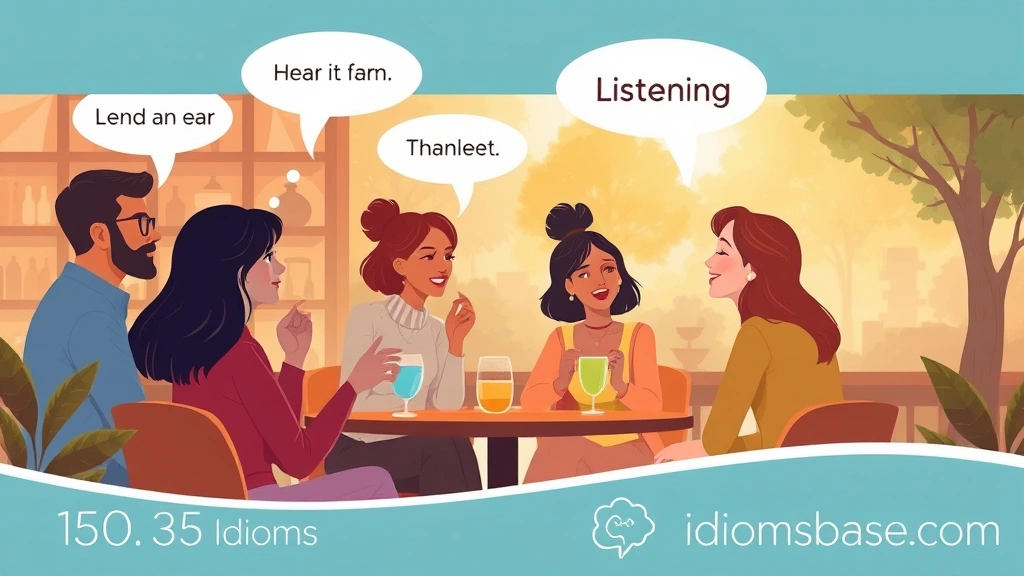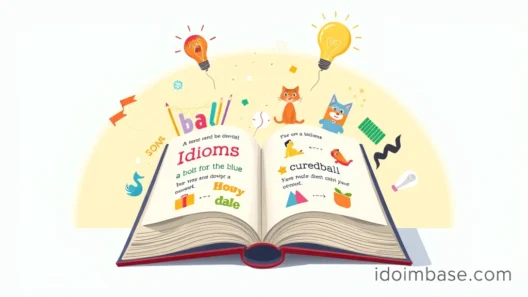Oh, hello there, wonderful reader! Have you ever noticed how much of our daily lives revolves around listening? It’s not just about hearing sounds; it's about truly understanding, connecting, and even empathizing. From a casual chat with a friend to a crucial business meeting, listening plays a starring role. But sometimes, words just don't quite capture the nuance of what it means to lend an ear. That's where idioms come in! These colorful expressions add a splash of vibrancy to our language, helping us convey complex ideas with a simple phrase.
Today, we're diving headfirst into the fascinating world of idioms about listening. Get ready to discover 35 brilliant phrases that will not only enrich your vocabulary but also give you a deeper appreciation for the art of paying attention. So, lean in, open your mind, and let's explore these linguistic gems together!
The Power of Paying Attention: 35 Idioms About Listening
Listening is a superpower, wouldn't you agree? It's how we learn, grow, and build relationships. And just like any superpower, it has its own unique set of expressions. Let’s unwrap these 35 fantastic idioms that perfectly capture the essence of listening.
Idioms About Actively Listening and Understanding
These idioms highlight the act of truly hearing and comprehending what's being said.
-
All ears: When someone says they're "all ears," it means they are giving you their full and undivided attention, ready to listen intently. Imagine a dog with its ears perked up – that's the vibe!
- Example: "Tell me all about your trip; I'm all ears!"
-
Lend an ear: This means to listen to someone in a sympathetic or attentive way, often when they need to talk about something important. It's an act of kindness.
- Example: "If you ever need to vent, I'm happy to lend an ear."
-
Hear someone out: To "hear someone out" means to listen to everything they have to say, without interrupting, until they are finished. It's about giving someone a complete platform.
- Example: "Please, just hear me out before you make a decision."
-
Pay attention: This straightforward idiom means to focus your mind on what is being said or done. It's the foundation of effective listening.
- Example: "You need to pay attention in class if you want to understand the lesson."
-
Take note of: To "take note of" something means to pay special attention to it because it is important or noteworthy. It implies a degree of mental recording.
- Example: "Please take note of the deadlines for the project."
-
Drink it in: This vivid idiom suggests absorbing information or an experience completely, like a thirsty person drinking water. It’s about fully immersing yourself in what you're hearing.
- Example: "The speaker was so inspiring; I just tried to drink it all in."
-
Hang on every word: If you "hang on every word," you are listening very carefully and eagerly to everything someone says, often because you find it fascinating or important.
- Example: "The children hung on every word of the storyteller."
-
Soak it up: Similar to "drink it in," this means to absorb information or knowledge readily and completely.
- Example: "He was new to the team, and eager to soak up all the advice he could get."
-
Keep your ear to the ground: This means to stay informed about current trends, opinions, or developments, often by listening to rumors or informal conversations.
- Example: "If you want to know what's happening in the industry, you need to keep your ear to the ground."
-
Have an ear for something: This idiom means to have a good ability to hear, recognize, or appreciate specific sounds, like music or languages.
- Example: "She has a real ear for different accents."
Idioms About Not Listening or Ignoring
Sometimes, despite our best efforts, people just don't listen. These idioms capture those moments.
-
Turn a deaf ear: To "turn a deaf ear" means to deliberately ignore someone or refuse to listen to what they are saying, often because you don't want to help or be bothered.
- Example: "He turned a deaf ear to his parents' advice."
-
In one ear and out the other: This describes information that is heard but immediately forgotten or disregarded. It didn't stick!
- Example: "I told him what to do, but it just went in one ear and out the other."
-
Fall on deaf ears: If something "falls on deaf ears," it means that advice, warnings, or requests are ignored or not listened to.
- Example: "His pleas for help fell on deaf ears."
-
Pay no mind: This means to disregard something; to not worry or be concerned about it.
- Example: "Don't pay him any mind; he's just trying to provoke you."
-
Tune out: To "tune out" means to stop paying attention or to ignore what is being said or happening.
- Example: "The lecture was so boring, I just completely tuned out."

-
Close your ears to: This means to intentionally avoid listening to something, often because it's unpleasant or you disagree with it.
- Example: "She closed her ears to their complaints."
-
Switch off: Similar to "tune out," this means to stop paying attention or thinking about something.
- Example: "After a long day at work, I just want to switch off and relax."
Idioms About Overhearing or Eavesdropping
These idioms relate to listening without being directly involved in the conversation.
-
Overhear: To "overhear" means to accidentally hear a conversation that is not intended for you.
- Example: "I overheard them talking about the new project."
-
Eavesdrop: This means to secretly listen to a private conversation. It's a bit more intentional than just "overhearing."
- Example: "It's rude to eavesdrop on other people's conversations."
-
Walls have ears: This idiom is a warning that someone might be listening to what you are saying, even if you think you are speaking privately.
- Example: "Be careful what you say; walls have ears."
Idioms About Being Heard or Understood
These idioms focus on the speaker's desire to be listened to and comprehended.
-
Get through to someone: To "get through to someone" means to make someone understand what you are trying to say, especially when they have been resistant or slow to grasp it.
- Example: "I tried to explain it to him, but I just couldn't get through to him."
-
Make yourself heard: This means to speak loudly or clearly enough so that people can hear you, especially in a noisy environment. It can also mean to ensure your opinion is considered.
- Example: "In the crowded room, she struggled to make herself heard."
-
Have the ear of: If you "have the ear of" someone important, it means they are willing to listen to your advice or opinions.
- Example: "As a trusted advisor, he has the ear of the CEO."

- A word in your ear: This phrase is used when you want to speak to someone privately, often to give them advice or a warning.
- Example: "Can I have a word in your ear about something?"
Idioms About Being Alert and Prepared to Listen
These idioms emphasize readiness to listen and respond.
-
Keep your ears open: This means to be alert and ready to hear something important or interesting.
- Example: "Keep your ears open for any news about the job opening."
-
Prick up your ears: When someone "pricks up their ears," they suddenly start listening very carefully, often because they have heard something surprising or interesting.
- Example: "When I mentioned a bonus, everyone in the room pricked up their ears."
-
Listen up! This is an informal command to pay attention, often used when someone has important information to share.
- Example: "Listen up, everyone! I have an important announcement."
-
Be all ears (again): Yes, it's so good we're listing it twice, because it perfectly captures total readiness to listen!
Idioms About Understanding the Subtleties of What's Heard
These idioms delve into deeper levels of comprehension, often involving unspoken cues.
-
Read between the lines: This means to understand the unstated meaning or hidden implications of something. You're not just hearing the words, but the deeper message.
- Example: "He said he was fine, but if you read between the lines, you could tell he was upset."
-
Hear it on the grapevine: To "hear it on the grapevine" means to learn about something through informal rumor or gossip, rather than from an official source.
- Example: "I heard on the grapevine that they're planning to expand."
-
Have a good ear for: This idiom, similar to "have an ear for something," emphasizes a natural talent for discerning or appreciating particular sounds or linguistic nuances.
- Example: "She has a good ear for different musical genres."

-
It rings a bell: If something "rings a bell," it sounds familiar to you, but you can't quite remember the details.
- Example: "His name rings a bell, but I can't place where I know him from."
-
Listen with half an ear: This means to listen without giving full attention, often while doing something else. It's casual, not fully engaged listening.
- Example: "He was listening with half an ear while he was scrolling through his phone."
-
Don't hear a peep: This means to hear absolutely nothing, often implying silence or a lack of communication.
- Example: "After the argument, I didn't hear a peep from him for a week."
-
Hear a pin drop: This describes a situation that is extremely quiet, often because everyone is listening intently or is in suspense.
- Example: "When the verdict was announced, you could hear a pin drop in the courtroom."
Wow, what a journey through the world of listening idioms! Aren't they just fantastic? They truly show how rich and nuanced our language is, especially when it comes to such a fundamental human interaction.
Key Takeaways
- Listening is multifaceted: These idioms highlight various aspects of listening, from active engagement to passive reception, and even deliberate avoidance.
- Context is King: The meaning of an idiom is heavily dependent on the situation it's used in.
- Enrich Your Communication: Using these idioms can make your English more colorful, expressive, and natural-sounding.
- Cultural Nuances: Idioms often reflect cultural values, and understanding them can provide insight into how different cultures perceive communication.
Frequently Asked Questions (FAQ)
You've got questions about these fascinating phrases, and we've got answers!
Q1: Why are idioms important in English?
Idioms are incredibly important because they add richness, color, and naturalness to the English language. They allow speakers to convey complex ideas or emotions concisely and often with a touch of humor or vivid imagery. Without idioms, English would sound much more literal and less expressive. Plus, understanding them is key to truly grasping native English conversations and media!
Q2: How can I learn to use these idioms correctly?
The best way to learn and use idioms correctly is through exposure and practice.
- Read widely: Pay attention to how native speakers use them in books, articles, and online content.
- Listen actively: Watch movies, TV shows, and podcasts, noting down idioms you hear.
- Practice: Try incorporating one or two new idioms into your conversations or writing each week. Don't be afraid to make mistakes; that's part of the learning process!
- Look up meanings: If you're unsure, always check the meaning and common usage in a reliable dictionary or idiom resource.
Q3: Are these idioms commonly used in everyday conversation?
Yes, many of the idioms on this list are very commonly used in everyday English conversations, especially those related to active listening like "all ears," "lend an ear," and "pay attention." Others, like "hear it on the grapevine" or "prick up your ears," are also quite common. While some might be used less frequently than others, knowing them will definitely enhance your comprehension of spoken English.
Q4: Can I use these idioms in formal writing?
It depends! Idioms vary in their formality. For instance, "pay attention" is perfectly acceptable in formal writing. However, more informal idioms like "in one ear and out the other" or "tune out" might be better suited for casual or semi-formal contexts. When in doubt, it's always safer to opt for more direct, literal language in very formal academic or business writing. For creative writing, however, go wild!
Q5: Do idioms about listening exist in other languages?
Absolutely! Every language has its own set of idioms, and many cultures have unique ways of expressing ideas related to listening, attention, and understanding. While the literal translations might not make sense, the underlying concepts are often universal. Exploring idioms in different languages is a fantastic way to learn about cultural nuances and linguistic creativity.
Q6: What's the difference between "overhear" and "eavesdrop"?
Great question! The main difference lies in intent.
- Overhear: This means to hear something accidentally, without intending to listen. You might just be in the vicinity of a conversation.
- Eavesdrop: This implies a deliberate and often secretive act of listening to someone else's private conversation without their knowledge or permission. It's generally considered rude.
So, while both involve hearing a conversation not meant for you, "eavesdrop" suggests a conscious effort to listen in.
We hope this deep dive into idioms about listening has been as enjoyable for you to read as it was for us to write! Remember, the world is full of fascinating linguistic treasures, and being attentive to them, just like being attentive to others, can open up whole new levels of understanding. So keep those ears open, and happy communicating!





